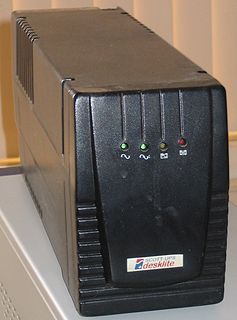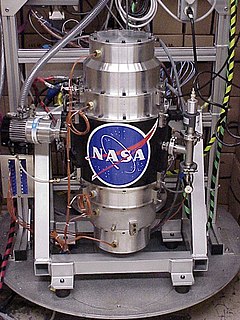
Energy storage is the capture of energy produced at one time for use at a later time. A device that stores energy is generally called an accumulator or battery. Energy comes in multiple forms including radiation, chemical, gravitational potential, electrical potential, electricity, elevated temperature, latent heat and kinetic. Energy storage involves converting energy from forms that are difficult to store to more conveniently or economically storable forms.

An uninterruptible power supply or uninterruptible power source (UPS) is an electrical apparatus that provides emergency power to a load when the input power source or mains power fails. A UPS differs from an auxiliary or emergency power system or standby generator in that it will provide near-instantaneous protection from input power interruptions, by supplying energy stored in batteries, supercapacitors, or flywheels. The on-battery run-time of most uninterruptible power sources is relatively short but sufficient to start a standby power source or properly shut down the protected equipment. It is a type of continual power system.

A flywheel is a mechanical device specifically designed to efficiently store rotational energy, which is proportional to the square of its rotational speed and its mass. Flywheels resist changes in rotational speed by their moment of inertia and in order to change a flywheel's stored energy its rotational speed must be increased or decreased. Since flywheels act as mechanical energy storage devices, they are the kinetic-energy-storage analogue to electrical inductors, for example, which are a type of accumulator. Like other types of accumulators, flywheels smooth the ripple in power output, providing surges of high power output as required, absorbing surges of high power input as required, and in this way act as low-pass filters on the mechanical velocity of the system.
"Lydia, the Tattooed Lady" is a 1939 song written by Yip Harburg and Harold Arlen. It first appeared in the Marx Brothers movie At the Circus (1939) and became one of Groucho Marx's signature tunes.
Nat Perrin was an American comedy film and television screenwriter, producer and director who contributed gags and storylines to several Marx Brothers films and co-wrote the script for the film Hellzapoppin' (1941) adapted from the stage musical. He is credited with writing the screenplay or story outline for over 25 films, including The Big Store (1941), The Great Morgan (1945), and Song of the Thin Man (1947), as well as several television series.

Frank Brandon Nelson was an American comedic actor best known for playing put-upon foils on radio and television, and especially for his "EEE-Yeeeeeeeeesssss?" catchphrase.
David George Dirk Maggs is a British freelance writer and director working across all media. He is principally known for his work in radio, where he evolved radio drama into "Audio Movies," a near-visual approach combining scripts, layered sound effects, cinematic music and cutting edge technology. He pioneered the use of Dolby Surround in BBC Radio. He was among the first nominees for the Directors Guild of Great Britain Outstanding Achievement in Radio Award, and in 2005 he was invited to become one of the first Honorary Fellows of the University of Winchester for his work in the dramatic arts.
Shyster is a slang word for someone who acts in a disreputable, unethical, or unscrupulous way, especially in the practice of law, sometimes also politics or business.

Grid energy storage is a collection of methods used for energy storage on a large scale within an electrical power grid. Electrical energy is stored during times when electricity is plentiful and inexpensive or when demand is low, and later returned to the grid when demand is high, and electricity prices tend to be higher.
Flywheel, Shyster, and Flywheel is a situation comedy radio show starring two of the Marx Brothers, Groucho and Chico, and written primarily by Nat Perrin and Arthur Sheekman. The series was originally broadcast in the United States on the National Broadcasting Company's Blue Network beginning November 28, 1932, and ended May 22, 1933. Sponsored by the Standard Oil Companies of New Jersey, Pennsylvania and Louisiana and the Colonial Beacon Oil Company, it was the Monday night installment of the Five-Star Theater, an old-time radio variety series that offered a different program each weeknight. Episodes were broadcast live from NBC's WJZ station in New York City and later from a sound stage at RKO Pictures in Los Angeles, California, before returning to WJZ for the final episodes.
Lorelei Elizabeth King is an American actress, screenwriter and development executive who has been based in the United Kingdom since 1981. She has narrated audiobooks, acted in radio plays for BBC Radio 4 and appeared on television.
"Hooray for Captain Spaulding" is a song, originally from the 1928 Marx Brothers Broadway musical Animal Crackers and the 1930 film version. It later became well known as the theme song for the Groucho Marx television show You Bet Your Life (1950–1961), and became Groucho's signature tune and was usually played when he was introduced on various talk shows and the like.
Vincent Marzello was an American actor.
Five-Star Theater is an American radio series that premiered on Monday, November 28, 1932, on NBC's Blue Network, sponsored by the Standard Oil Companies of New Jersey, Pennsylvania and Louisiana and the Colonial Beacon Oil Company. It was broadcast every weeknight at 7:30 p.m., but with a different program of comedy, music or drama each night.
Flywheel, Shyster, and Flywheel is a BBC Radio 4 1990 situation comedy radio show, adapted from a 1932 American radio show of the same name. The original series starred two of the Marx Brothers, Groucho and Chico, and was written primarily by Nat Perrin and Arthur Sheekman. It depicted the misadventures of a small law firm, with Groucho acting as attorney Waldorf T. Flywheel, and Chico playing Flywheel's assistant Emmanuel Ravelli. In 1988 the show scripts were rediscovered in the US Library of Congress, and were adapted by the BBC two years later. The lead roles are performed by professional Marx Brothers soundalikes: Michael Roberts as Groucho's Flywheel and Frank Lazarus as Chico's Ravelli. Other cast members include Lorelei King playing all the female roles, with Spike Milligan and Dick Vosburgh guest starring. During the recording sessions, on occasions Michael Roberts would adlib certain comments and these were left in the final recordings.

Flywheel energy storage (FES) works by accelerating a rotor (flywheel) to a very high speed and maintaining the energy in the system as rotational energy. When energy is extracted from the system, the flywheel's rotational speed is reduced as a consequence of the principle of conservation of energy; adding energy to the system correspondingly results in an increase in the speed of the flywheel.
Kinetic Traction Systems is a business founded in November 2010, producing Flywheel energy storage systems for electric railways and grid storage.

A dual-mass flywheel is a rotating mechanical device that is used to provide continuous energy in systems where the energy source is not continuous, the same way as a conventional flywheel acts, but damping any violent variation of torque or revolutions that could cause an unwanted vibration. The vibration reduction is achieved by accumulating stored energy in the two flywheel half masses over a period of time but damped by a series of strong springs, doing that at a rate that is compatible with the energy source, and then releasing that energy at a much higher rate over a relatively short time. A compact dual-mass flywheel often includes the whole clutch, including the pressure plate and the friction disc.






